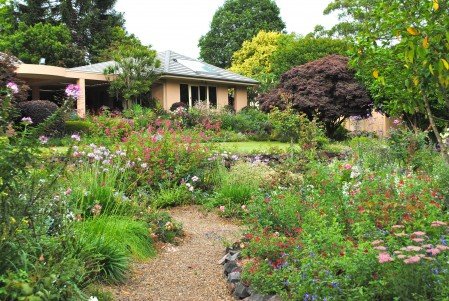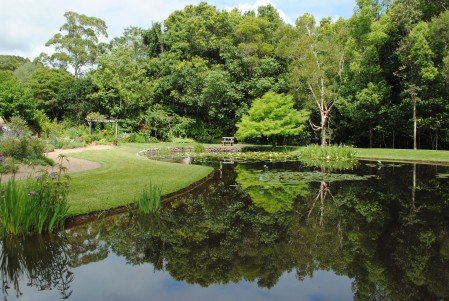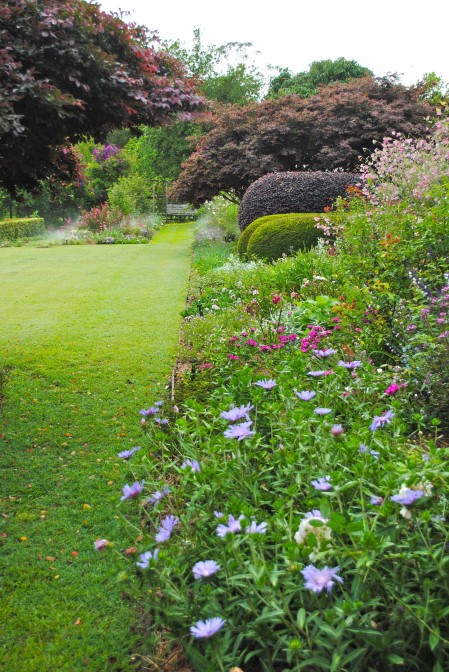Presenting the CobraHead Blog’s first ever guest post!
Barbara Wickes of the ‘The Perennial Poppies Group’ garden club was our first international customer. Somehow she found us on the world wide web soon after we opened for business and we’re happy that she did! We’ve been shipping CobraHead Weeders and CobraHead Long Handles to Australia ever since.
Barb has kindly consented to write a post from Down Under so we can see what their club has been doing and let our readers know what’s happening in gardening a half a world away.
What a strange year we have had – unusually dry through the Christmas period of 2011 when everything in the garden looked amazing! The roses had never looked better at that time of year. We were aware that the wet was coming and thank goodness it didn’t hit with the intensity of the previous year when so much of Australia had such severe flooding. The members of our cottage garden group live in various areas throughout southeast Queensland so there are many various climatic areas – some in the hinterland areas get frosts in winter. At Buderim where I live we often get heavy rain through summer months and at times at least 10 inches in less than a week! Our winters are dry and this year there has not been a drop of rain for the month of August. As I write on 18th September light rain is falling which is very welcome as we are opening our garden on 20-21 October with Open Gardens Australia. This is a not-for-profit organization that opens private gardens throughout Australia to promote the enjoyment, knowledge and benefits of gardening.
Our cottage garden group is called ‘The Perennial Poppies Group’ and within the group we have a salvia study group. There would be around 150 different salvias growing in our gardens and our aim is to trial salvias and encourage more people to grow them. There are many that suit the sub-tropical climate however, like all gardeners we attempt to grow some of those more suited to a temperate climate. Members living in the Hinterland of our coastal regions have more success with temperate plants and successfully grow a lot of deciduous trees. We have a lovely copse of tropical birch, a liquidambar, ornamental pear, swamp cypress (taxodium) and a Nyssa sylvatica – all colour up beautifully.
High temperatures and high humidity are the biggest problems for our salvias and although March can still be humid, generally the temperatures are not as high and the nights are cooler. Pruning needs to be done carefully until the cooler weather arrives and I find that pruning half of the plant and waiting for new growth to appear before completing the job is generally successful with the microphyllas and greggiis.
At Buderim, which is 15 minutes from the coast, our soil is lovely sandy loam and a pleasure to work with. The addition of organic matter certainly makes a difference to its water holding qualities. I like to garden organically and when pruning the ‘cut and drop’ method is used for smaller prunings. Lots of organic fertilizer is then spread before topping with a hay mulch. Larger prunings are dropped in the back corner of our acre under trees where they eventually rot down. Prior to our open garden we foliar feed weekly with a variety of organic products and this certainly brings on the flowering.
Old-fashioned roses are a favourite with many of our members. We grow the old Teas, Noisettes, Hybrid Musks, Polyanthas and Floribundas. In our sub-tropical climate we don’t get a cold winter so they never really get a break. Pruning is usually done in July/August as throughout the autumn up to the end of May we can have beautiful blooms. That time of year is very gentle on them.
I discovered the ‘Cobrahead’ some 10 years ago and our group regularly orders them. The word how good they are spreads fast. Since the blue handled one has been available I haven’t lost one! Prior to that the neutral handled one would get lost in the mulch! Over the years I have found the ‘lost’ ones – rather worse for the experience but still usable!
Barb Wickes
The Perennial Poppies Group Inc
18th September, 2012



